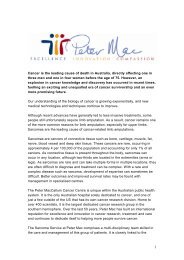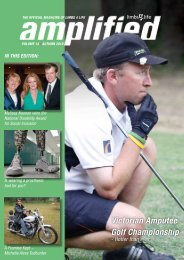I was born without my arm almost about 30 (32) years ... - Limbs 4 Life
I was born without my arm almost about 30 (32) years ... - Limbs 4 Life
I was born without my arm almost about 30 (32) years ... - Limbs 4 Life
Create successful ePaper yourself
Turn your PDF publications into a flip-book with our unique Google optimized e-Paper software.
enough <strong>was</strong> enough. I had a spinal fusion to partially correct <strong>my</strong> scoliosis. If I had <strong>my</strong><br />
time over again, I definitely would have worn <strong>my</strong> brace. Having a spinal fusion at 16 <strong>was</strong><br />
tough. I spent the following two <strong>years</strong> off the sporting field.<br />
Following high school, I studied Outdoor Education at Bendigo University. My core<br />
subjects included rock climbing, bushwalking and skiing. They challenged me and I<br />
learned a lot <strong>about</strong> <strong>my</strong>self.<br />
During <strong>my</strong> third year of study, I <strong>was</strong> invited to play in an amputee tennis tournament in<br />
Melbourne. I had never played sport against athletes with disabilities. This <strong>was</strong> for a<br />
couple of reasons. Firstly, I <strong>was</strong> able to play sport at a reasonable level against ablebodied<br />
participants. Secondly, as I <strong>was</strong> <strong>born</strong> <strong>without</strong> <strong>my</strong> <strong>arm</strong> I didn’t think that I <strong>was</strong><br />
eligible for disability sport. I hadn’t considered <strong>my</strong>self an “amputee”, but for the purposes<br />
of disability sport, I soon realised that I <strong>was</strong> eligible to compete against other people with<br />
disabilities. The tennis tournament changed <strong>my</strong> life. It <strong>was</strong> there that I met David Evans,<br />
another tennis player who suggested that I have a go at athletics. A couple of months<br />
later, I competed in the Australian Amputee Athletic Titles and did reasonably well,<br />
winning <strong>my</strong> events.<br />
The Paralympic Head Coach for athletics<br />
suggested that the 1996 Paralympic Games<br />
in Atlanta were a possibility for me. Ten<br />
months later, I got <strong>my</strong>self a coach, started<br />
training and transferred <strong>my</strong> studies to part<br />
time. I qualified for Atlanta in the 100m,<br />
200m and 4x100m relay events for<br />
amputees on the track. Although<br />
I missed out on winning an individual medal,<br />
I <strong>was</strong> fortunate to be a part of the relay team that won gold and broke the world record.<br />
Standing on the medal dais with the national anthem playing and the flag being raised in<br />
our honour <strong>was</strong> a moment I will never forget.<br />
Following Atlanta, I moved to Melbourne to further pursue athletics. Leading up to the<br />
Sydney Paralympic Games, I <strong>was</strong> consistently running under 11 seconds for 100m. This<br />
has been the benchmark for upper limb amputee sprinters around the world.<br />
The Sydney Paralympic Games in 2000 <strong>was</strong> an incredible experience. The Games put<br />
disability and the abilities of disabled people at the forefront of a mainstream audience.<br />
The crowds loved it, and we were finally being recognised by the public as athletes first.<br />
Although I missed out on placing in the 100m, I <strong>was</strong> again part of the relay team that<br />
won the 4x100m. We also won the 4x400m in world record time. Australia has a great<br />
2




